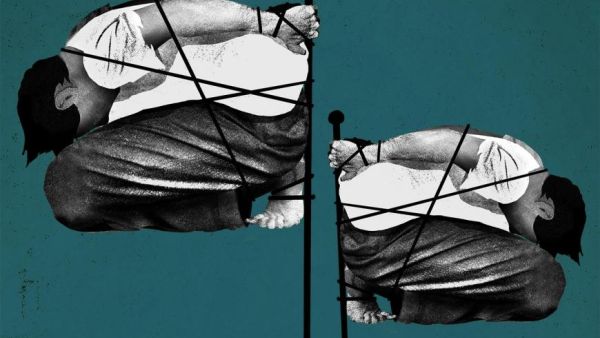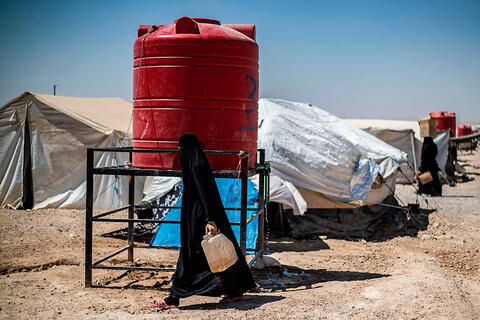Russia-backed armed groups in eastern Ukraine are torturing and ill-treating people in custody, Human Rights Watch said today. Human Rights Watch has obtained new information about several women being held by the “Donetsk people’s republic” (or “DNR,”) on apparently fabricated charges of “espionage,” who are facing serious health issues.
One woman was pregnant when she was detained in May 2021, two others have serious medical conditions for which they have not received treatment, and the fourth was tortured and held incommunicado.
Their cases underscore grave concerns about the health and safety of all detainees held by armed groups in nongovernment-controlled parts of the Donetska and Luhanska regions in eastern Ukraine, as well as particular concerns about a lack of appropriate medical care for women detainees, including sexual and reproductive health care. The de facto authorities should immediately release them and anyone else being arbitrarily detained.
“The torture and other ill-treatment by armed groups is epitomized by their cruel treatment of women in custody,” said Yulia Gorbunova, senior Europe and Central Asia researcher at Human Rights Watch. “To our knowledge, many detainees are being held incommunicado, in appalling conditions, and without access to a fair legal process or proper medical care.”
Human Rights Watch spoke with the family members of four women detainees, human rights activists close to their cases, and people who had been in detention with them.
The de facto “DNR” authorities have arbitrarily held Oksana Parshina, who is pregnant, since May 14 on suspicion of “espionage.” Since July 2019, they have arbitrarily held Natalia Statsenko, a medical doctor who has a chronic and painful neurological condition affecting her spine for which she needs immediate medical attention. Elena Zaitseva, arrested in March 2019, has had severe bleeding episodes, possibly related to a gynecological condition, but has received no medical care in custody. Olga Mozolevskaya was tortured and spent four years in incommunicado detention before being transferred to another detention facility in May. None of these women have received appropriate medical care in detention, Human Rights Watch said.
Since the war began in eastern Ukraine in 2014, Russia-backed armed groups in Donetska and Luhanska regions have detained hundreds of civilians, accusing them, among other charges, of “espionage,” “participating in sabotage reconnaissance,” or “state treason.” In many cases, the groups refuse to acknowledge the person’s detention or whereabouts, making the detentions enforced disappearances.
A July 2 report by the Office of the United Nations High Commissioner for Human Rights, which documented arbitrary detention, torture, and ill-treatment, by Ukrainian state authorities and by Russia-backed armed groups, in the context of the armed conflict, concluded that “arbitrary detention remained a daily occurrence in territory controlled by self-proclaimed ‘republics’” and that the majority of people held there for conflict-related reasons had been subjected to torture and ill-treatment.
In a 2019 report, the UN special rapporteur on torture said he “received persistent allegations of torture and ill treatment at the time of arrest and during interrogation” by armed groups.
In many cases, the “DNR” accuses people of “espionage” – and the “Luhansk people’s republic” (“LNR”) of “state treason” because they or their family members are perceived to have pro-Ukraine views, or because they have family members who work in Ukraine’s law enforcement, Human Rights Watch said.
Estimates vary as to the number of people currently held on such politically motivated charges. Media Initiative for Human Rights, a Ukrainian group that monitors unlawful detention by armed groups, estimates that at least 170 are being held, while Ukraine state security services say there are 268. The July 2 UN report said that the “DNR” and “LNR” are holding a total of between 300 and 400 conflict-related detainees, including non-civilians.
Ukrainian activists said that some of the men held there also have serious health problems, including as a result of torture, that prison authorities are ignoring. These include Vyacheslav Zasyupko, 44, who was severely tortured, including with electric shocks, since his detention in September 2018; Vitaly Atamanchuk, 70, who has been in custody since March 2018 and has a leg fracture and others.
With no legal process available, the detainees’ only hope for release is to be exchanged for prisoners or detainees held by the Ukrainian government. There have been several such exchanges, the latest in April 2020. People released in previous exchanges have given extensive accounts of torture and other ill-treatment, including in the “Izoliatsiia” detention center in Donetsk, which is notorious for torture and long periods of incommunicado detention.
Under international human rights and humanitarian law, people who are arbitrarily detained should be immediately and unconditionally released. While in custody, detainees have a right to be treated with humanity and respect for their inherent dignity, and that includes access to appropriate medical care. The de facto authorities should immediately provide urgent access to adequate medical care to all detainees.
More than 100 governments, @UN entities, regional and civil society organizations, academic institutions and private sector groups announced their signatory status to the @WPSHACompact the #GenerationEquality Forum in Paris. #ActForEqualhttps://t.co/6xCHXjLw3L pic.twitter.com/Gb48C9DkH1
— UN Women (@UN_Women) July 3, 2021
The United Nations Rules for the Treatment of Women Prisoners and Non-custodial Measures for Women Offenders (the “Bangkok Rules”) addresses the distinctive needs of women in custody, including providing gender-specific health care and specific accommodations for pregnant and breastfeeding women.
“The de facto authorities have an appalling record of abuse of detainees that needs to stop,” Gorbunova said. “All those wrongfully held should be freed immediately.”








